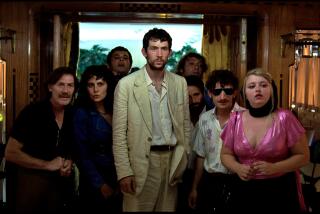Movie review: ‘White Material’
Simultaneously poetic, dramatic and realistic, “White Material” is an altogether stunning work. Directed by Claire Denis and starring Isabelle Huppert in a bravura performance as a woman confronting armed chaos in Africa, this is filmmaking that is at once exhilarating and chilling, powerful and powerfully disturbing.
Though not a marquee name in this country, French director Denis is so respected internationally that the British film journal Sight & Sound declared “there is no better filmmaker working in the world right now.” Having grown up in Africa, which she used as the setting for her signature film, 1988’s “Chocolat,” Denis takes us back again, to a nameless country caught in the brutal, catastrophic struggle between a ruthless regime and a rebel army filled with child soldiers.
Though it deals with serious political themes and confronts deep personal issues, perhaps the most unexpected thing about “White Material” is that it never forgets to add artful beauty to the mix.
Working with cinematographer Yves Cape and screenwriting partner Maria N’Diaye, Denis displays a stunning yet casual visual sense. It’s the equivalent of painting with film, revealing, for example, the unlooked-for loveliness in smoke from arson fires rising languidly through the trees. When you add in the brooding music of the British band Tindersticks, the result is a moody, evocative experience.
Also visible is the director’s gift for making reality seem dreamlike and disconcerting, her ability to convey how profoundly surreal the harshest life-and-death situations can be. A feeling of unsettling chaos pervades this slowly disintegrating society, where casual, thoughtless violence and amorality are the rules, and the film intentionally blurs its sense of time so that you are never exactly sure from moment to moment what’s going on.
Standing like a rock in the midst of this slow-motion riot is Maria Vial, who married into a family that owns a sizable coffee plantation that she in effect runs. Thin but implacable, using the strength of will visible on her face as a weapon, she is oblivious to her standing as “white material,” the local term for colonials, and determined to not to allow this savage civil war to stand in the way of getting her coffee crop harvested.
When others say “coffee is not worth dying for,” she replies “We do not have to be terrorized, we can fight back.” When French Army troops tell her they are leaving the area and advise her to depart as well, she contemptuously refuses, expressing disdain for “the whites” who don’t deserve to live in this wonderful country.
It’s not only the army that has no confidence in her; her own family has its doubts. Her former husband, Andre (Christophe Lambert in a part that can’t help but reference his role as Tarzan in “Greystoke”), has ideas of his own about the crisis, and their feckless son, Manuel (Nicolas Duvauchelle), can barely be bothered to get out of bed. Plus the charismatic Boxer (Isaach De Bankolé), the idol of the rebellious child soldiers, also factors into the equation.
Huppert has made a career out of characters that are fiercer than fierce, but though her intensity draws us in immediately, the fearless, formidable Maria has a much more potent, more complicated emotional arc here than we may be expecting. Maria’s strength of will is undeniably a force of nature, but whether she is to be admired, pitied or castigated for that strength turns out to be a considerably more complex question.
Serving as an atmospheric backdrop for all this personal drama is the chilling reality of an African nation still trying to find its own kind of equilibrium, a place where child soldiers can change from sleeping innocents to cutthroat killers in the literal blink of an eye. With her formidable filmmaking skills to take us through it, Denis once again confronts a situation we think we know and makes us see it all over again.
More to Read
The biggest entertainment stories
Get our big stories about Hollywood, film, television, music, arts, culture and more right in your inbox as soon as they publish.
You may occasionally receive promotional content from the Los Angeles Times.







